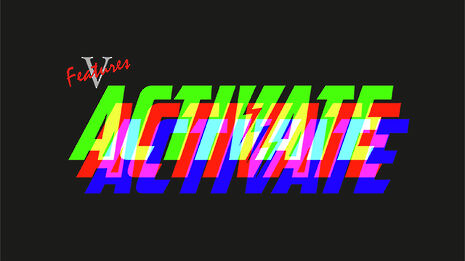Just keep scrolling…
In his first column, Sam Brown suggests that the origins of 21st century media ‘binge culture’ lie in the business practices of a handful of Silicon Valley executives. Should they be held to account?

Every year, Reed Hastings, CEO of Netflix, walks into a conference room in Los Gatos, California to give a talk to his workers. The subject: sleep deprivation. Not how to prevent it. Hastings would consider that a waste of his very precious time. No – his topic of discussion is how to cause it.
In this speech, Hastings consistently implores his employees to remember: “Amazon or HBO are not really our competition. Sleep is our competition. We want to be so great and have so much content that you never sleep.” Sleep is our competition. Even by the standards of a cutthroat, dollar-driven CEO, this phrase strikes me as cold and malevolent - deliberately altering human nature, exploiting a psychological vulnerability to addiction. Cultivating profits from a sleep-deprived generation, caught in the ‘just one more’ cycle that we have all been a victim to. It’s a beautiful business strategy, which also epitomises Silicon Valley’s tendency to forego moral practices in favour of greed and financial gain through psychological exploitation.
"The TV-series binge has become ingrained into modern culture, a product of an age obsessed with instant gratification and reward"
There is no doubt Hastings’ strategy works. Seventy-percent of Netflix viewers admit to binge-watching and the average subscriber completes a show’s first series in only seven days. Indeed, according to Netflix themselves, three-quarters of viewers who streamed the first season of Breaking Bad finished all seven episodes in one viewing session. The TV-series binge has become ingrained into modern culture, a product of an age obsessed with instant gratification and reward.
Netflix – along with Facebook, Snapchat, and all other major media platforms, has mastered the art of exploiting addictive behaviour and subtly prolonging the binge, with features such as ‘post play’, which automatically starts a new episode fifteen seconds after the credits start rolling. This alone has caused far too many of my evenings to give themselves over to the dulcet tones of Frank Underwood in House of Cards or to the admittedly gripping The Crown.
Social media utilises similar methods to keep users scrolling for hours on end. In his documentary ‘HyperNormalisation’, Adam Curtis refers to social media as an ‘echo chamber’ which uses algorithms with so much data about you that your news feed is tailored to only include what it knows you will like. In the world of your social media feed, therefore, the political spectrum is narrowed to your taste, and targeted advertisements cater to your material needs. A quick scroll through my Facebook feed supports this notion: there is a notable absence of anything even vaguely right-wing, and a general surplus of garlic bread memes and adverts for flannel shirts (don’t judge me). Suffice to say this ‘quick’ scroll soon turned into a 30-minute session.
The psychology behind these practices is multifaceted. Watching a good TV programme or gaining social validation from being ‘appreciated’ on social media can help to repress or normalise feelings of stress, anxiety, or depression – emotions that, paradoxically, can be precipitated in the highly competitive and aesthetically-orientated world of social media. Being in a state of stress or anxiety can also cause you to adopt ‘reward seeking behaviour’, prioritising the ‘reward’ of nice feelings over any consequences that may arise due to this.
"A natural human tendency towards addictive behaviour is thus reinforced and actively encouraged by media platforms"
In turn, the process of binging on a form of media releases pleasure inducing hormones (dopamine and serotonin), making us want more, particularly when in a state of sadness or vulnerability. Both Netflix and Facebook facilitate this desire for more with their never-ending stream of media – what former Product Philosopher at Google Tristan Harris refers to as the “bottomless bowl” effect.
The psychological exploitation does not stop there. Media platforms deliberately fashion themselves to link a user’s action to “intermittent variable rewards”, a psychological concept developed by B.F. Skinner and explored by Tristan Harris. In a sense, every time you update your notifications or email feed, you are subscribing to this game-like play for the ‘reward’ of a Facebook like or email message. The more variable the reward, the more addictive the media, as constant checking is required to stay in touch with the seemingly random reward system. A natural human tendency towards addictive behaviour is thus reinforced and actively encouraged by media platforms, to the user’s loss and company’s gain.
The question, therefore, of whether the blame for addictive binge culture lies in our weak willpower or with the Silicon Valley facilitators is relatively easy to answer. It is the Mark Zuckerbergs and Reed Hastings of this world who are at fault for so many hours wasted, so many dissertations left unfinished, and so many real social opportunities missed. And yet, of course, the power of these tech giants is so inconceivably large that the only way to counter the unhealthy binge practices they facilitate is to target the other side of the equation: our own addictive behavioural patterns.
It was T.S. Eliot who once claimed we moderns are “distracted from distraction by distraction”. All I will say is: try and remember this when the fifteen-second countdown begins, and the choice is between one more hour of Netflix indulgence and the precious sleep Reed Hastings so evidently dislikes
 News / Clare Hall spent over £500k opposing busway 24 December 2025
News / Clare Hall spent over £500k opposing busway 24 December 2025 Comment / The ‘class’ of Cambridge24 December 2025
Comment / The ‘class’ of Cambridge24 December 2025 News / Eight Cambridge researchers awarded €17m in ERC research grants27 December 2025
News / Eight Cambridge researchers awarded €17m in ERC research grants27 December 2025 News / Caius mourns its tree-mendous loss23 December 2025
News / Caius mourns its tree-mendous loss23 December 2025 Comment / League tables do more harm than good26 December 2025
Comment / League tables do more harm than good26 December 2025









